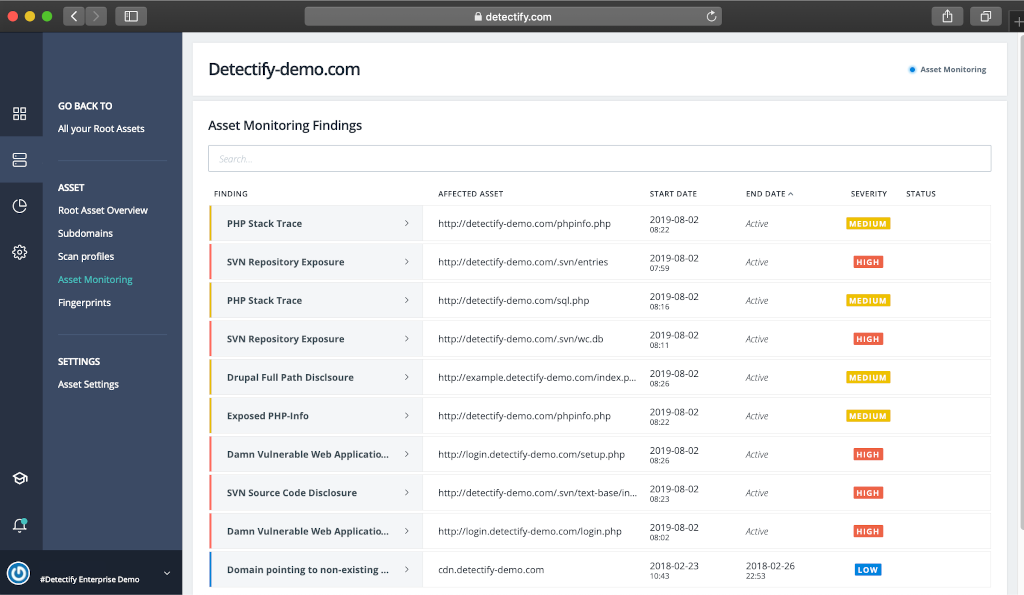Continuing the topic about perimeter services. As I mentioned earlier, I don’t think that the external perimeter services should be considered as a fully functional replacement for custom Vulnerability Management processes. I would rather see their results as an additional feed showing the problems your current VM process has. Recently I tested the Detectify’s Asset Inventory (Monitoring) solution, which provides such feed by automatically detecting the issues with your second, third (and more) leveled domains and related web services.

Let say your organization has several second level web domains, over9000 third (and more) level domains, and you even don’t know for what services they are used. This is a normal situation for a large organization. So, you simply add yourorganization.com to Detectify, activate Asset Monitoring, and Detectify automatically discovers third (and more) level domains and related technologies: web services, CMS, JavaScript frameworks and libraries. “It provides thousands of fingerprints and hundreds of tests for stateless vulnerabilities such as code repository exposure for SVN or Git.” This is called fingerprinting.
Using this data Detectify can detect anomalies – findings: known vulnerabilities, misconfiguration, like the redirects to non-existing server, data disclosures, path traversal, etc.
Everything is practical, without any unexploitable trash, and can be exported using the API .
They have some python examples on github, but non-functional or for old python 2.7, so I wrote my own small python 3 scripts to export the data (fingerprints and findings) to the JSON file and read it.
Exporting Detectify Asset Inventory data to JSON file
#!/usr/bin/python
import requests
import json
import urllib3
urllib3.disable_warnings(urllib3.exceptions.InsecureRequestWarning)
headers = {"X-Detectify-Key":"a2341cb9c891436eb46cfdd41b255e18"}
url = "https://api.detectify.com"
results_fingerprints = dict()
results_findings = dict()
for domain in requests.get(url + "/rest/v2/domains/", headers=headers, verify=False).json():
subdomains = requests.get(url + "/rest/v2/domains/" + domain['token'] + "/subdomains/", headers=headers, verify=False).json()
print(domain['name'])
results_findings[domain['name']] = requests.get(url + "/rest/v2/domains/" + domain['token'] + "/findings/", headers=headers, verify=False).json()
results_fingerprints[domain['name']] = dict()
results_fingerprints[domain['name']]['params'] = domain
results_fingerprints[domain['name']]['fingerprint'] = requests.get(url + "/rest/v2/fingerprints/" + domain['token'] + "/?true", headers=headers, verify=False).json()
n= 1
for subdomain in subdomains:
print(str(n) + "/" + str(len(subdomains)) + ". " + subdomain['name'])
results_fingerprints[subdomain['name']] = dict()
results_fingerprints[subdomain['name']]['params'] = subdomain
results_fingerprints[subdomain['name']]['fingerprint'] = requests.get(url + "/rest/v2/fingerprints/" + subdomain['uuid'] + "/?true", headers=headers, verify=False).json()
n+=1
f = open("results.json","w")
f.write(json.dumps({"results_fingerprints":results_fingerprints,"results_findings":results_findings}, sort_keys=True, indent=4,))
f.close()Reading the exported Detectify Asset Inventory data file
And here is how to work with such file:
import json
f = open("results.json","r")
results = json.loads(f.read())
f.close()
print(len(results['results_fingerprints'].keys()))
for domainname in results['results_fingerprints']:
print(domainname)
for fingerprint in results['results_fingerprints'][domainname]['fingerprint']:
print( " " + fingerprint['software_name'] + " - " + fingerprint['software_version'])
findings_all = dict()
for domain in results['results_findings']:
for finding in results['results_findings'][domain]:
if not finding['title'] in findings_all:
findings_all[finding['title']] = set()
findings_all[finding['title']].add(finding['found_at'])
findings_all_keys = list(findings_all.keys())
findings_all_keys.sort()
for title in findings_all_keys:
print(title)
print(" - " + str(findings_all[title]))Detectify also provides a traditional Web Application Scanner, but I haven’t tested it yet.

Hi! My name is Alexander and I am a Vulnerability Management specialist. You can read more about me here. Currently, the best way to follow me is my Telegram channel @avleonovcom. I update it more often than this site. If you haven’t used Telegram yet, give it a try. It’s great. You can discuss my posts or ask questions at @avleonovchat.
А всех русскоязычных я приглашаю в ещё один телеграмм канал @avleonovrus, первым делом теперь пишу туда.
